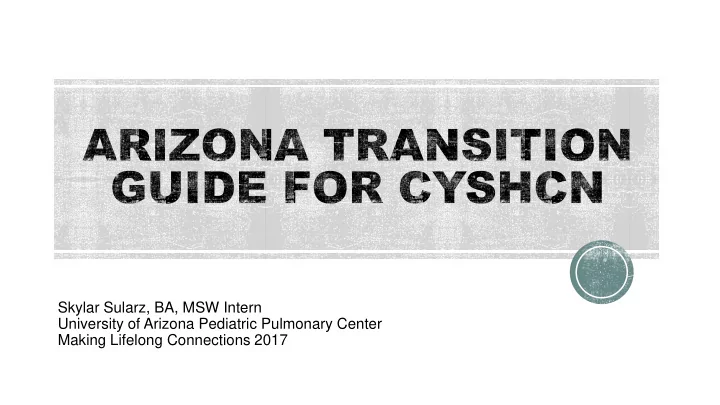

Skylar Sularz, BA, MSW Intern University of Arizona Pediatric Pulmonary Center Making Lifelong Connections 2017
What is health care transition? What is the goal of transition?
20% of children 18 and under have a special health care need 90% of children with special health care needs live to adulthood Multiple systems Maternal and Child Health (MCH) Transition to Adulthood
What is known? Current Status of Transition Preparation Among Youth With Special Health Needs in the United States The 2020 Federal Youth Transition Plan Clinical Report- Supporting the Health Care Transition From Adolescence to Adulthood in the Medical Home
Florida Health and Transition Services Tool Box
The University of Arizona Pediatric Pulmonary Center (PPC) Cystic Fibrosis Transition Passport Program ArizonaLEND
To improve the successful transition from pediatric to adult care of children and youth with special health care needs by providing comprehensive educational information to patients, parents, and caregivers
1. Create a transition flowchart with state specific resources for patients and parents/caregivers 2. Send flowchart to be reviewed by selected sample consisting of patients, parents/caregivers, providers, and MCHB professionals 3. Post flowchart with applicable links on the PPC and LEND websites for patients and parents/caregivers
4. Create and post a needs assessment survey within the PPC and LEND transition links so patients and parents/caregivers can provide feedback as to which areas they would like further information 5. Execute online or in-person transition fair and/or online modules to address CYSHCN transition needs based upon needs assessment results
Sample Patients, parents/caregivers, health care providers, MCHB professionals Questions
1. Do you feel that the information provided in this step is age/developmentally appropriate? 2. If no, what information would be more helpful to include? 3. Do you feel that the resources provided on IEP and 504 plans, IEP Tips, and Advocacy Tips are useful to prepare patients/families for transition? 4. If no, what information or resources would be helpful to include?
5. Are there other resources or topics you believe should be addressed in this step? If yes, please provide feedback and comments below. 6. Do you believe the tasks listed in this section are appropriate for this age group? 7. If no, what tasks would be helpful to include or change?
Age/developmentally appropriate Resources Tasks Formatting Grammar/ phrasing
Potential Revisions Insurance Medications Grammar/phrasing
Post flowchart with applicable links on the PPC and LEND websites Needs assessment survey Online or in-person transition fair and/or online modules
Children with special health care needs. (2016). Health Resources & Services Administration. Retrieved from https://mchb.hrsa.gov/maternal-child-healthtopics/children-and-youth-special health-needs# Clinical report: Supporting the health care transition from adolescence to adulthood in the medical home. (2011). American Academy of Pediatrics. 182-200. For youth & families. (n.d.) FloridaHATS. Retrieved from http://www.floridahats.org/for-youth-families/ Lorenzo, S. B. (2014). Transition to adulthood. National Center for Education in Maternal and Child Health. Retrieved from https://www.ncemch.org/evidence/NPM-12-transition.php McManus et al. (2013). Current status of transition preparation among youth with special needs in the United States. American Academy of Pediatrics, 13(6), 1091-1097. McPherson et al. (1998). A new definition of children with special health care needs. American Academy of Pediatrics; 137-140. The 2020 federal youth transition plan: A federal interagency strategy. (2015). Federal Partners in Transition Workgroup. Youth & families. (2017). Got Transition. Retrieved from http://www.gottransition.org/youthfamilies/index.cfm
Skylar Sularz Email: ssularz@asu.edu http://uappc.peds.arizona.edu Developed by Skylar Sularz, BA, MSW intern, UA PPC Social Work Trainee under the supervision of Mary McGuire, MSW, Pediatric Pulmonary Center Social Work Faculty. Support (in part) by the Maternal and Child Health Bureau, HRSA, Grant #T72MC00012
Recommend
More recommend